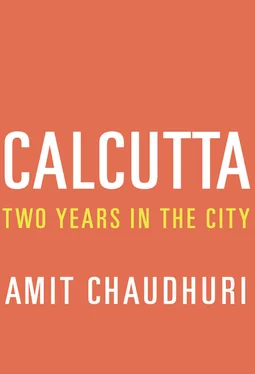In mid-2007 I saw that another one of the genteel bourgeois houses of South Calcutta, this one in a frequently used by-lane in Ekdalia, had come down. Nothing unusual about that; it’s been happening for twenty-five years, and, these days, this destruction is almost a daily occurrence. In fact, though I must have passed this particular house a hundred times, I hadn’t really noticed it until now, when it was already demolished — that, too, wasn’t wholly surprising. What caught my attention, as the car went past, were the French windows that, loosed from their original locations, had been stacked vertically against each other on one side. They’d been left facing the pavement; I got out of the car to look, never having seen the windows like this, out of context, before.
That night, I had a brainwave — that I would buy one of the windows. What I’d do with it I still had no clear idea. Was it part of some incipient project I’d been half-heartedly entertaining for the past two years — another flabbergasting branching out, moving from novel-writing to music-making, from music-making to musical composition, from composing to collecting? Whatever the reason, I wanted to acquire that window.
When I told my wife the next day, she didn’t throw her hands up in despair, but nodded in a way that suggested that what I’d said made perfect sense. That evening, we took a detour — because Ekdalia is both near her parents’ flat and near Gariahat Market — and entered the by-lane to see those windows. She was transfixed by them. We wondered what would happen if we just lifted one and took it home, except that would be stealing — besides, it was too big (and dirty, the frame covered in dirt) for our car. A watchman at the shop opposite and a boy observed us, but no one could give us anything but vague advice about whom to contact if we wanted to buy a window. A few days later, half-expecting them to have gone, I convinced myself and my wife to visit the lane again — but during the day — to make one last effort. The windows were there; this time my wife, more curious and more of an explorer than I am, slipped into the site, lost to her own speculations, and called me after a few minutes. “Look at that,” she said — a door from the same house was leaning against a wall. It was painted a green — the generic colour of the French windows in Calcutta — which was still bright in patches, though much of it had peeled off in scabs. What was striking — at least to us — about the door, which comprised two doors contained within a doorway, were the rectangles on the upper halves, which themselves framed two nubile lotus-shaped iron grilles. These would have been inner doors then, but not the main one (given their slightly decorative and pervious quality)? It was difficult to be certain.
The family — like the house — had vanished. Everything pointed towards them being Bengali: the location of the house; the kind of house it was; their inability, or desire, to hold on to it. Possibly West Bengali — that is, people from these parts; it was unlikely (but not impossible) that a displaced East Bengali family could, after Partition, have afforded property in this area. The house might well have come up before Partition, of course; its remnants, the door, especially, reeked of bygone bhadralok respectability.
It was proving difficult to contact them now. Neither the watchman at the shop nor the boy nor any of those who hung out on the pavement had any idea how to, nor saw it necessary to have any idea. Someone on the site finally gave me a mobile number and a name — not a Bengali name — and told me to call this man if I wanted a window. He was neither the builder nor the contractor, but had something to do with the construction of the new building.
At least two kinds of migration have shaped Calcutta in the last thirty years. The first has to do with the flight outward of the middle and upper middle classes, which began close on the heels of the flight outward of capital — leading, eventually, to the sale of houses like the one in question. You can wager that the story behind the sale is simple and typical. The younger generation is elsewhere: New Delhi, or even New Jersey. The ageing parents (or parent) live in the house, which they may or may not have built, but where the children were born. Upkeep is difficult. One day, their secret wish comes true — a “promoter” makes an offer: a large sum of money, and two flats in the building that will come up where the house was.
The second type of migration has been taking place within the city itself, feeding the property boom of the last decade, in that false dawn of investment in the state. Although people woke up from that dawn in 2009 to find things reverting to a stubborn, paradoxical, politics-induced changelessness, that migration — and, to an extent, the incongruous boom — continues. It involves Marwaris who’ve been moderately successful as traders and who’ve lived traditionally in the North, moving to the more desirable South, where the boxwallah, or corporate employee, once lived — not to mention the bhadralok, and, long ago, in places like Alipore, the old colonial rulers, and, even today, the great Marwari industrialist families (Birla, Goenka, Jalan, Khaitan), who are to be found behind immense gates, in serenely ensconced estates. The other principal candidates for buying up flats and condominiums in the new buildings are the dreaded NRIs, who are of the city and yet not of it, who are Bengali despite being something else. These are people who left thirty years ago for Michigan, New Jersey, or Atlanta — the ugly acronym stands for Non-Resident Indian, and encompasses movement, desire, pride, memory, and, plausibly, disappointment. The NRIs are not necessarily coming back; against their better judgement though, they do want to keep one foot planted in the city in which they grew up.
The two- or three-storeyed bhadralok houses of South Calcutta, with their slatted windows and floors of red stone, their rooftop terraces, are less valuable than the land they stand on. In London, the prices of the narrow Victorian houses with their dark facades go up and up because the affluent want to move into them. In Prenzlauer Berg in East Berlin, inaccessible to West Germans until the wall collapsed, the bohemian and artistic set pushed property prices upward because they wanted to occupy those mysterious, socialist, pre-fabricated apartments. People in South Calcutta shake their heads when an old house comes down — but are also plotting, of course, to move to a better city. When I was last in Berlin three years ago, the memorialisation of the past was relentless, but the attempt, by Berliners, to embrace and re-inhabit the city’s troubled post-War history was striking too. Calcutta has still not recovered from history: people mourn the past, and abhor it deeply.
“Kaun baat kar raha hai?” Who’s this?
Every time I called the number the man on the site had given me, I got to speak to Ram Singh’s brother or brother-in-law. Ram Singh was either at the site or having lunch. Two days later, he answered the phone himself.
“Hello — haan — kaun?”
“Ram Singh?”
“Haan, Ram Singh”—a distant concession, coming from one distracted all day by construction work — now in Ekdalia, where he was never to be seen; now, as I was told, in Dover Lane — and unscheduled lunch breaks in the afternoon.
“Woh jo Ekdalia mei khidki hain, main ek kharidne chahta hoon.” Those windows in Ekdalia — I’d like to buy one .
There was nothing at the other end except the silence of prevarication — as he tried to piece together what I was on about.
Then, quite patiently, he repeated, “Khidki?”
Yes, one window — and the door.
In a business-like way, he told me (as if he were inured to this kind of query) that they’d cost me three and a half thousand rupees; this excluded the price of having them delivered in a tempo. Although I didn’t know what the market price of used windows was — my guess was nothing — I thought the offer reasonable. I immediately asked him to take down my address, and provided directions.
Читать дальше












